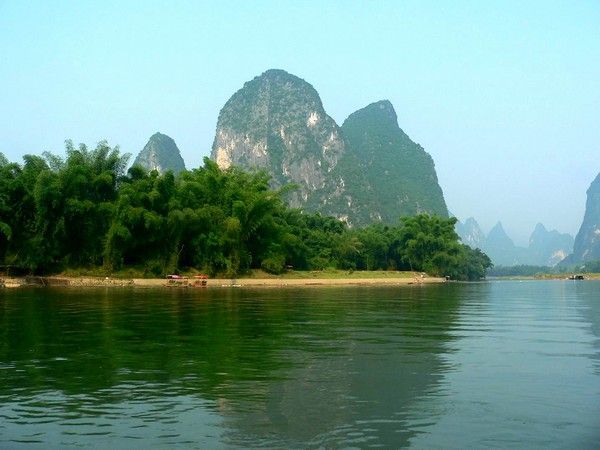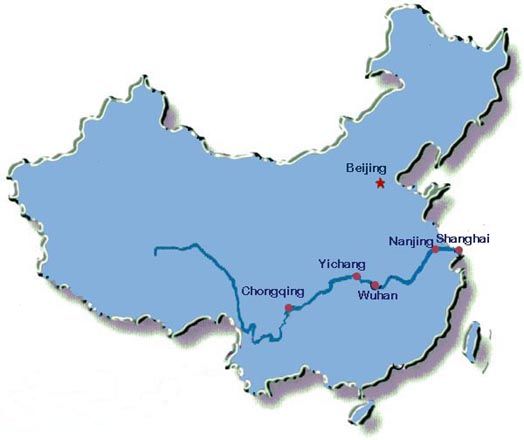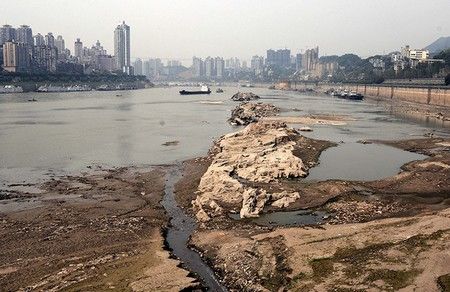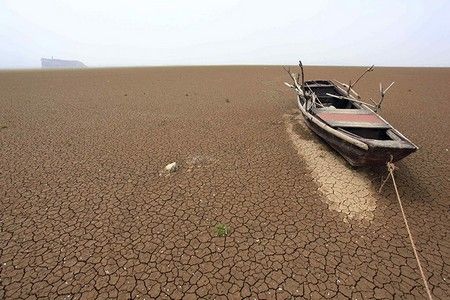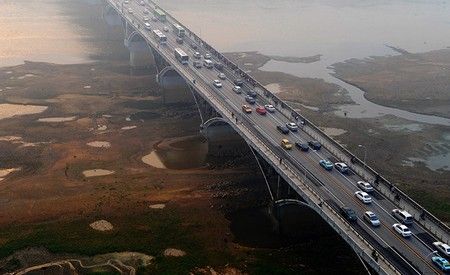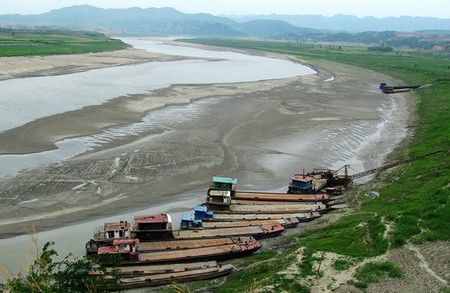It looks like you're using an Ad Blocker.
Please white-list or disable AboveTopSecret.com in your ad-blocking tool.
Thank you.
Some features of ATS will be disabled while you continue to use an ad-blocker.
share:
I came across an article today that is a few days old, was published in the NY Times, and begins:
North China is dying.
How could I pass the read?
But first here is a quick 20 second lesson on the Yangtze River.
Yangtze River
The Yangtze is the longest river in Asia, and the third-longest in the world. It flows for 6,418 kilometres (3,988 mi) from the glaciers on the Tibetan Plateau in Qinghai eastward across southwest, central and eastern China before emptying into the East China Sea at Shanghai. It is also one of the biggest rivers by discharge volume in the world. The Yangtze drains one-fifth of China's land area and its river basin is home to one-third of China's population.
Now for the astonishing article, which is the subject of this thread:
Plan for China’s Water Crisis Spurs Concern
A chronic drought is ravaging farmland. The Gobi Desert is inching south. The Yellow River, the so-called birthplace of Chinese civilization, is so polluted it can no longer supply drinking water. The rapid growth of megacities — 22 million people in Beijing and 12 million in Tianjin alone — has drained underground aquifers that took millenniums to fill.
Not atypically, the Chinese government has a grand and expensive solution: Divert at least six trillion gallons of water each year hundreds of miles from the other great Chinese river, the Yangtze, to slake the thirst of the north China plain and its 440 million people.
The engineering feat, called the South-North Water Diversion Project, is China’s most ambitious attempt to subjugate nature. It would be like channeling water from the Mississippi River to meet the drinking needs of Boston, New York and Washington.Its $62 billion price tag is twice that of the Three Gorges Dam, which is the world’s largest hydroelectric project. And not unlike that project, which Chinese officials last month admitted had “urgent problems,” the water diversion scheme is increasingly mired in concerns about its cost, its environmental impact and the sacrifices poor people in the provinces are told to make for those in richer cities.
:shk:
Really?
The article continues:
Three artificial channels from the Yangtze would transport precious water from the south, which itself is increasingly afflicted by droughts; the region is suffering its worst one in 50 years. The project’s human cost is staggering — along the middle route, which starts here in Hubei Province at a gigantic reservoir and snakes 800 miles to Beijing, about 350,000 villagers are being relocated to make way for the canal. Many are being resettled far from their homes and given low-grade farmland; in Hubei, thousands of people have been moved to the grounds of a former prison.
snip
The most surprising thing is that this doesn't even seem like a marginal solution for the problem they are trying to fix. For example:
Overseers of the eastern route, which is being built alongside an ancient waterway for barges called the Grand Canal, have found that the drinking water to be brought to Tianjin from the Yangtze is so polluted that 426 sewage treatment plants have to be built; water pollution control on the route takes up 44 percent of the $5 billion investment, according to Xinhua, the official news agency. The source water from the Han River on the middle route is cleaner. But the main channel will cross 205 rivers and streams in the industrial heartland of China before reaching Beijing.
...
Officials in Tianjin are so skeptical of the eastern route’s ability to deliver drinkable water that they are looking at desalinization as an alternative. Planners have more hope for the middle route, though the engineering is a much greater challenge — the canal has to be built entirely from scratch, with 1,774 structures constructed along its length to channel the water, since there is no pre-existing waterway like the Grand Canal to follow.
...
“We feel that we are still unsure how the project is going to impact on the environment, ecologies, economies and society at large,” said Mr. Du, the geographer in Wuhan, who carefully added he was not outright opposed to the project.
So notwithstanding the fact that many critics within China don't believe this will work, the project obviously continues...
And the environmental impact, while unclear, could be staggering:
Some Chinese scientists say the diversion could destroy the ecology of the southern rivers, making them as useless as the Yellow River. The government has neglected to do proper impact studies, they say. There are precedents in the United States. Lakes in California were damaged and destroyed when the Owens River was diverted in the early 20th century to build Los Angeles.
Here, more than 14 million people in Hubei would be affected if the project damaged the Han River, the tributary of the Yangtze where the middle route starts, said Du Yun, a geographer at the Chinese Academy of Sciences in Wuhan, the provincial capital.
...
In a paper published in the Bulletin of the Chinese Academy of Sciences, Mr. Du and two co-authors estimated that the diversion project would reduce the flow of the middle and lower stretches of the Han significantly, “leading to an uphill situation for the prevention of water pollution and ecological protection.” Though the study first appeared in 2006, the government has not altered its original plan, Mr. Du said.
Central planners decided on the amount of water to be diverted based on calculations of water flow in the Han done from the 1950s to the early 1990s; since then, the water flow has dropped, partly because of prolonged droughts, but planners have made no adjustments, Mr. Du said. The amount to be diverted is more than one-third of the annual water flow. “That will exert a huge damaging impact on the river,” he said.
What can one even say about any of this?
This isn't a project with implications only for the Chinese, but one that may have global impact.
So when is all of this getting done?
The middle route is to start major operations in 2014, and the eastern route is expected to be operational by 2013.
But wait! Here is the real irony:
Worse drought in 50 years plagues Yangtze River's downstream provinces
See also: China drought affects more than 34 million people along Yangtze River
And:
Maybe fears of Chinese world dominance are overblown...
It also sounds like the Chinese are engaged in a full-scale war with Mother Nature. But unfortunately, it looks like they are set upon a path of mutual destruction.
What morons people can be sometimes.
edit on 5-6-2011 by loam because: (no reason given)
edit on Fri Jun 10 2011 by DontTreadOnMe because: shortened some of the
quotes. please limit the amount of quoted copyrighted material
This doesn't look good.
Why are they trying to control nature, all the will get is a swift kick to the face.
Why are they trying to control nature, all the will get is a swift kick to the face.
Good and well thought out post aside from your last comment.
You seem to forget that the Western World has damaged more of the entire planet for oil, minerals, power even #s and giggles sometimes then China ever has. Although I do not agree with their ideas to divert massive bodies of water to struggling areas I would not be so quick as to call them idiots. Especially with the track record the Western World has in regards to the environment and mother earth.
I was going to flag and star but for your immature and stupid comment at the end I won't bother.
You seem to forget that the Western World has damaged more of the entire planet for oil, minerals, power even #s and giggles sometimes then China ever has. Although I do not agree with their ideas to divert massive bodies of water to struggling areas I would not be so quick as to call them idiots. Especially with the track record the Western World has in regards to the environment and mother earth.
I was going to flag and star but for your immature and stupid comment at the end I won't bother.
edit on Fri Jun 10 2011 by DontTreadOnMe
because: MOD NOTE: ALL MEMBERS: We expect civility and decorum within all topics - Please
Review This Link.
the worse part about this, is this isnt localized to china, we have been doing this globally, trying to conform nature to our needs and desires, not
to call it whims and pettiness.
then we act all surprised when nature provides us that swift kick on the...gonads.
then we act all surprised when nature provides us that swift kick on the...gonads.
edit on 5/6/11 by AnotherYOU because: (no reason given)
Just can't see how they think this is going to solve their problems. Diverting water from an area already hit by record drought. Mixing polluted
water into systems with major problems of their own is pretty obviously a bad move. It seems that once the Chinese get an idea into their heads, no
matter how bad, they just charge ahead. Imagine, they built the Three Gorges Dam on fault lines and it's having a impact on those lines. What happens
if all that weight triggers a quake and the water gets released at once. Wouldn't want to be any where near when it goes.
I never ever predict anything, but mark my words, before this century is over, fresh water will be the number one concern facing the world. Wars will
be fought, people will murder, and millions of lives will be lost over drinking water.
Simply put, we are using it faster than nature can produce it. We can't effectively convert sea water yet (which would be the only caveat to the above statement, should we invent the means). Humanities requirements far exceeds the supply, and when reserves are gone...balance must ensue.
IMO settling yourself into a location with a reliable natural water supply is one of the most important things you can do for your family.
Simply put, we are using it faster than nature can produce it. We can't effectively convert sea water yet (which would be the only caveat to the above statement, should we invent the means). Humanities requirements far exceeds the supply, and when reserves are gone...balance must ensue.
IMO settling yourself into a location with a reliable natural water supply is one of the most important things you can do for your family.
Originally posted by Imhotepsol
Good and well thought out post aside from your last comment.
You seem to forget that the Western World has damaged more of the entire planet for oil, minerals, power even #s and giggles sometimes then China ever has. Although I do not agree with their ideas to divert massive bodies of water to struggling areas I would not be so quick as to call them idiots. Especially with the track record the Western World has in regards to the environment and mother earth.
I was going to flag and star but for your immature and stupid comment at the end I won't bother.
You confuse what has been done to what is planned.
You understand, that is a major.startling difference?
And trying to blame the West for what the East is contemplating is indicative of your loyalities which are not with Natue. And I would say that YOUR closing comment is the one greatest at fault
edit on 5-6-2011 by Aliensun because: errors
reply to post by loam
What happens when those 1.3/1.7 billion people come out swinging looking for better water/land after they finish trashing theirs in the headlong mostly unregulated dash building the worlds largest economy?
I wrote a thread a few weeks back about the Three Gorges Dam and all the warnings their Government studies have been releasing to the general public. Here-->Beijing Admits to 'Urgent' Problems with Three Gorges Dam Phrases such as "Catastrophic and geological disasters" were numerous
I'm glad some in China are becoming aware of the impact. Reading through the thread and links I couldn't help but think of that Lake that the Soviets drained by diverting rivers for irrigation which touched off an environmental downward spiral while attempting to match the West farm production during the Cold War creating an ecological disaster. It's not just "Corporate greed" but still, that's no excuse.
[atsimg]http://files.abovetopsecret.com/images/member/af659292582e.jpg[/atsimg]
[atsimg]http://files.abovetopsecret.com/images/member/5208b1e59445.jpg[/atsimg]
The disastrous human and environmental effects of Soviet
collectivization on Kazakhstan
Maybe fears of Chinese world dominance are overblown...
It also sounds like the Chinese are engaged in a full-scale war with Mother Nature. But unfortunately, it looks like they are set upon a path of mutual destruction.
What happens when those 1.3/1.7 billion people come out swinging looking for better water/land after they finish trashing theirs in the headlong mostly unregulated dash building the worlds largest economy?
I wrote a thread a few weeks back about the Three Gorges Dam and all the warnings their Government studies have been releasing to the general public. Here-->Beijing Admits to 'Urgent' Problems with Three Gorges Dam Phrases such as "Catastrophic and geological disasters" were numerous
I'm glad some in China are becoming aware of the impact. Reading through the thread and links I couldn't help but think of that Lake that the Soviets drained by diverting rivers for irrigation which touched off an environmental downward spiral while attempting to match the West farm production during the Cold War creating an ecological disaster. It's not just "Corporate greed" but still, that's no excuse.
[atsimg]http://files.abovetopsecret.com/images/member/af659292582e.jpg[/atsimg]
[atsimg]http://files.abovetopsecret.com/images/member/5208b1e59445.jpg[/atsimg]
The disastrous human and environmental effects of Soviet
collectivization on Kazakhstan
Arguably the most drastic economic policy employed by Marxist-fashioned governments and the Soviet Union was that of agricultural and industrial collectivization. Forcing local Soviets to develop state-controlled farms and industrial construction projects, the Soviet collectivization programs generally had two overarching purposes: the ideological liberation of the Soviet orbit from class antagonisms and the concupiscent parasitism of “kulak” banditry, and the economic attainment of a fiscally self-sufficient Marxist society. Soviet republics endured two major phases of collectivization that yielded both beneficial and catastrophic effects.
reply to post by loam
The elephant in the room no one ever wants to talk about is over population. Everything else in our life is regulated
to the hilt but not propagation.Anyone can have kids.
Good post and your comment at the end was spot on.
The elephant in the room no one ever wants to talk about is over population. Everything else in our life is regulated
to the hilt but not propagation.Anyone can have kids.
Good post and your comment at the end was spot on.
reply to post by blamethegreys
I cannot remeber where I saw this prophecy, maybe someone can help remember. There were two and maybe independent. One was that when an accident occurs at the Three Gorges Dam it was a sign that many problems would occur in the world relating to Earthquakes or Volcano activity. The second was related that the yellow race (chinese) would cross the Yangtese river to invade? Can anybody remember?
In peace and love.
I cannot remeber where I saw this prophecy, maybe someone can help remember. There were two and maybe independent. One was that when an accident occurs at the Three Gorges Dam it was a sign that many problems would occur in the world relating to Earthquakes or Volcano activity. The second was related that the yellow race (chinese) would cross the Yangtese river to invade? Can anybody remember?
In peace and love.
reply to post by thedeadwalkk
Well ya know the ol movie with Tom Hanks. This has all the makings of Stupid is as Stupid does. Actully I think that this should come under the heading of ignorance. They seem to have all the money and lack the intellelectual process of rational thought.
Well ya know the ol movie with Tom Hanks. This has all the makings of Stupid is as Stupid does. Actully I think that this should come under the heading of ignorance. They seem to have all the money and lack the intellelectual process of rational thought.
Actually, I would argue that this spurs fear of China's dominance in the world for a few reasons.
1. China is one of the few countries with enough money on hand to be able to actually try and solve this problem. Any global repercussions are not going to be their main concern and they seemingly can continue to pump billions of dollars into a solution since their GDP continues to grow at a steady rate. The reason I confidently state that global repercussions are not going to be much of a concern is due to their high air pollution rate and their continued and growing use of coal and oil.
2. If their land is no longer suitable to support their current population, one of their solutions may be to broaden the area of Chinese dominance, thus acquiring additional land, through monetary measures or possibly military measures, and then being able to relocate large swaths of their population.
3. Any country facing dire prospects for its citizens is going to seek drastic measures, such as the one outlined in the article, in order to fix the problem. The real problem will come when either this solution doesn't work, or is too far from being completed and too much farmland and people will suffer long before the project is completed.
You have one of the largest populations of people, in a country with one of the largest bank accounts globally, and they are in desperate need of a solution. Couple that with the fact that the people in this country don't get a vote or say in how the solution is reached and at least in my mind, this doesn't make them less threatening but rather more threatening. Perhaps not directly to the United States, but since we seem to get involved in everything anyway, it most certainly will eventually affect us indirectly.
Lastly, we also have to consider how many other countries are having difficulty with crops this year:
-- The United States due to flooding and severe winter
-- China due to drought
-- Kenya's grain crops due to weather and civil discord
-- Japan due to the earthquake/tsunami/radiation
-- Europe (on a smaller scale) due to E. Coli concerns and the ban of European imports to some countries (Russia so far) Should this E coli strain continue to spread, this could become a major source of concern throughout the summer and into the fall.
1. China is one of the few countries with enough money on hand to be able to actually try and solve this problem. Any global repercussions are not going to be their main concern and they seemingly can continue to pump billions of dollars into a solution since their GDP continues to grow at a steady rate. The reason I confidently state that global repercussions are not going to be much of a concern is due to their high air pollution rate and their continued and growing use of coal and oil.
2. If their land is no longer suitable to support their current population, one of their solutions may be to broaden the area of Chinese dominance, thus acquiring additional land, through monetary measures or possibly military measures, and then being able to relocate large swaths of their population.
3. Any country facing dire prospects for its citizens is going to seek drastic measures, such as the one outlined in the article, in order to fix the problem. The real problem will come when either this solution doesn't work, or is too far from being completed and too much farmland and people will suffer long before the project is completed.
You have one of the largest populations of people, in a country with one of the largest bank accounts globally, and they are in desperate need of a solution. Couple that with the fact that the people in this country don't get a vote or say in how the solution is reached and at least in my mind, this doesn't make them less threatening but rather more threatening. Perhaps not directly to the United States, but since we seem to get involved in everything anyway, it most certainly will eventually affect us indirectly.
Lastly, we also have to consider how many other countries are having difficulty with crops this year:
-- The United States due to flooding and severe winter
-- China due to drought
-- Kenya's grain crops due to weather and civil discord
-- Japan due to the earthquake/tsunami/radiation
-- Europe (on a smaller scale) due to E. Coli concerns and the ban of European imports to some countries (Russia so far) Should this E coli strain continue to spread, this could become a major source of concern throughout the summer and into the fall.
reply to post by Imhotepsol
Thank you.
I think my posting history sufficiently documents I have forgotten nothing with respect to the environmental follies of the West.
Moreover, your point with respect to the scale of Chinese damage in comparison to the West would be far more compelling if it were actually true.
See for example:
How China has Created a New Slave Empire in Africa
Or straight from the horse's mouth:
If I had the time, I could go on and on....
Take just for a single example the Three Gorges Dam:
The Dam That Shook the Earth
Three Gorges Dam has caused urgent problems, says China
Not to mention that some scientists believe that the Three Gorges Dam has measurably tilted the earth's axis and slowed its rotation. (Source and source.)
I can't seem to recall any Western projects doing the same.
To each his own, I guess.
Originally posted by Imhotepsol
Good and well thought out post aside from your last comment.
Thank you.
Originally posted by Imhotepsol
You seem to forget that the Western World has damaged more of the entire planet for oil, minerals, power even #s and giggles sometimes then China ever has. Although I do not agree with their ideas to divert massive bodies of water to struggling areas I would not be so quick as to call them idiots. Especially with the track record the Western World has in regards to the environment and mother earth.
I think my posting history sufficiently documents I have forgotten nothing with respect to the environmental follies of the West.
Moreover, your point with respect to the scale of Chinese damage in comparison to the West would be far more compelling if it were actually true.
See for example:
How China has Created a New Slave Empire in Africa
Or straight from the horse's mouth:
China’s Environmental Crisis
China's economy has grown tenfold since 1978, and its focus on economic development at breakneck speed has led to widespread environmental degradation. "China has gone through an industrialization in the past twenty years that many developing countries needed one hundred years to complete," said Pan Yue, vice minister of China's Ministry of Environmental Protection (MEP) in a 2007 report in Germany's Spiegel. Yue was then the deputy director of China's State Environmental Protection Administration (SEPA), which became the MEP in March 2008.
But Elizabeth C. Economy, a CFR senior fellow and expert on China's environment, says the argument that China is experiencing the same growing pains as any other industrialized nation "fundamentally mischaracterizes" the issue. The "scale and scope of pollution far outpaces what occurred in the United States and Europe" during their industrial revolutions, she says. Moreover, China's environmental woes have hurt its economy. The damage to the ecosystem costs China about 9 percent of its GDP, according to the United Nations Development Program.
If I had the time, I could go on and on....
Take just for a single example the Three Gorges Dam:
The Dam That Shook the Earth
Three Gorges Dam has caused urgent problems, says China
Not to mention that some scientists believe that the Three Gorges Dam has measurably tilted the earth's axis and slowed its rotation. (Source and source.)
I can't seem to recall any Western projects doing the same.
Originally posted by Imhotepsol
I was going to flag and star but for your immature and stupid comment at the end I won't bother.
To each his own, I guess.
edit on 5-6-2011 by loam because: (no reason given)
On the other hand... diverting water out of the Yangtze river has the potential to relieve stress on Three Gorges Dam and maybe mitigate imminent
damages. Say, for instance the flow is reduced by 1/3, this provides more potential for flood control down river should rains return... if they reduce
the level behind the dam accordingly.
edit on 6/5/2011 by abecedarian because: (no reason given)
Where is all the water that is melting away from the polar ice caps going? we should be having more water than less.... inless its being vapourated by
our sun? thats been incresing tempature on this planet the last 20-30 years? or are we just using to much water these days we are 80% water in our
bodies. let me know what you think of my ideas thanks
reply to post by SLAYER69
Indeed.
Remember this great thread from worldwatcher?
Soon to be Worldwide Water Shortage??
The evidence is growing clearer. We are headed for troubled times.
Indeed.
Remember this great thread from worldwatcher?
Soon to be Worldwide Water Shortage??
The evidence is growing clearer. We are headed for troubled times.
I am a little confused about this. Is there anyone who can explain it for me?
China is drying up because of not enough rain? I thought the had this thing figured out with all their weather modification technology and all. Maybe because of their desire to make the 2008 Olympics rain free they went overboard. Here are the ATS threads discussing Chinas weather modification.....
www.abovetopsecret.com...
www.abovetopsecret.com...
www.abovetopsecret.com...
www.abovetopsecret.com...
www.abovetopsecret.com...
www.abovetopsecret.com...
www.abovetopsecret.com...
www.abovetopsecret.com...
So whats the deal? They have the technology proven by their own words. Did they mess things up and now can not reverse it? Is it a case of... You can't seed a cloud that is not there? or do they not have the technology to create a cloud to begin with? I just do not understand.
China is drying up because of not enough rain? I thought the had this thing figured out with all their weather modification technology and all. Maybe because of their desire to make the 2008 Olympics rain free they went overboard. Here are the ATS threads discussing Chinas weather modification.....
www.abovetopsecret.com...
www.abovetopsecret.com...
www.abovetopsecret.com...
www.abovetopsecret.com...
www.abovetopsecret.com...
www.abovetopsecret.com...
www.abovetopsecret.com...
www.abovetopsecret.com...
So whats the deal? They have the technology proven by their own words. Did they mess things up and now can not reverse it? Is it a case of... You can't seed a cloud that is not there? or do they not have the technology to create a cloud to begin with? I just do not understand.
reply to post by SLAYER69
OH MY,
With out a shadow of a doubt when the poo hits the fan, and it will, it will be apocalyptic,
OH MY,
With out a shadow of a doubt when the poo hits the fan, and it will, it will be apocalyptic,
For all of those who think future hold great things for us, think again.
Another case, not related to China, but quite worrying is the Alberta tar sand industry, soon in a decade or 2 the center of Canada will be a huge desert and you def. dont need to be a psychic to say that.
But in a way i feel responsible for that
simply because i didnt, figuratively, slap enough adults in the face.
Another case, not related to China, but quite worrying is the Alberta tar sand industry, soon in a decade or 2 the center of Canada will be a huge desert and you def. dont need to be a psychic to say that.
But in a way i feel responsible for that
simply because i didnt, figuratively, slap enough adults in the face.
new topics
-
What is your most awesome achievement or proudest moment, RE: something you were responsible for?
General Chit Chat: 2 hours ago -
Whistleblower warns FBI can’t be trusted with background checks for Trump’s nominees
Whistle Blowers and Leaked Documents: 3 hours ago -
Incoming TRUMP Admin will Declare a National Emergency to Mass Deport People Here Illegally.
Social Issues and Civil Unrest: 4 hours ago -
Like a Phoenix from the Ashes Notre-Dame Cathedral re-opens Next Month
Other Current Events: 4 hours ago -
Famous Catholic Exorcist Visits Mir-a-Lago
US Political Madness: 10 hours ago
top topics
-
Famous Catholic Exorcist Visits Mir-a-Lago
US Political Madness: 10 hours ago, 15 flags -
Incoming TRUMP Admin will Declare a National Emergency to Mass Deport People Here Illegally.
Social Issues and Civil Unrest: 4 hours ago, 14 flags -
Whistleblower warns FBI can’t be trusted with background checks for Trump’s nominees
Whistle Blowers and Leaked Documents: 3 hours ago, 10 flags -
What is your most awesome achievement or proudest moment, RE: something you were responsible for?
General Chit Chat: 2 hours ago, 6 flags -
Like a Phoenix from the Ashes Notre-Dame Cathedral re-opens Next Month
Other Current Events: 4 hours ago, 1 flags
active topics
-
Tomorrow will be the 7th day after the election, and they are still counting
US Political Madness • 48 • : matafuchs -
Famous Catholic Exorcist Visits Mir-a-Lago
US Political Madness • 11 • : BernnieJGato -
RFK is Trumps health pick
2024 Elections • 13 • : marg6043 -
What is your most awesome achievement or proudest moment, RE: something you were responsible for?
General Chit Chat • 7 • : lostgirl -
That "Welsh" Guy who Killed the Girls in Southport Now Charged with Terrorism Offences
Social Issues and Civil Unrest • 20 • : gortex -
Incoming TRUMP Admin will Declare a National Emergency to Mass Deport People Here Illegally.
Social Issues and Civil Unrest • 41 • : some_stupid_name -
WATCH LIVE: US Congress hearing on UFOs, unidentified anomalous phenomena
Aliens and UFOs • 116 • : Lazy88 -
The Acronym Game .. Pt.4
General Chit Chat • 970 • : JJproductions -
Whistleblower warns FBI can’t be trusted with background checks for Trump’s nominees
Whistle Blowers and Leaked Documents • 3 • : Astrocometus -
Well, here we go red lines crossed Biden gives the go ahead to use long range missiles
World War Three • 224 • : Oldcarpy2

